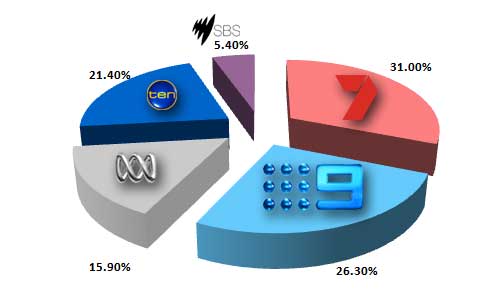There was one inescapable fact from the 2011 ratings campaign that ended at midnight on Saturday: no matter what Nine and Ten tried to spin, the Seven Network scooped the pool. In fact, Nine and Ten did everything to avoid mentioning the obvious: that they were walloped by Seven.
Seven and Nine’s releases made passing reference to audience data, but were more detailed about certain specific programs. Ten omitted the disaster that was The Renovators (a $25 million flop), while Nine neglected to mention the sharp fall in the audience for its main profit centre, its main channel.
While Seven, in claiming victory for news and current affairs nationally, forgot about the beating Nine News handed out to Seven News in Sydney and the way Today caught Sunrise as the year went on and beat it in Sydney and Melbourne. Minor points compared to the problems and gaps at Ten and Nine, but it does show that Seven also had problem areas to fix, and they are ones that will take time, money ad changes of personnel, if necessary, in 2012.
Nine saw its main channel audience down 14.7%, Ten’s fell 17.8%, the ABC, 12.8% and Seven’s lost 4%. But Seven’s two digital channels, 7TWO and 7mate grew their audiences and pushed the overall Seven audience up 11% in prime time. Ten’s main channel audience rose thanks to the presence of Eleven from January 11 this year and the mid-year revamp of ONE, which attracted more viewers in the second half of the year.
Seven’s prime time share rose to 31% in 2011, from 28.7% in 2010. Nine’s audience fell to 26.3% from 27.7%, Ten’s rose to 21.4% from, 21.1%, the ABC’s audience fell to 15.9% from 16.9% and SBS’s share eased to 5.4% from 5.6%.

In regional areas, a clean sweep for Seven and its affiliate, Prime. They won the year with a total FTA (three channels) share of 31.9%, from WIN/NBN on 29.1%, SC Ten was on 18.5%, the ABC (four channels) was on 15.2% and SBS (three) was on 5.3%. Prime/7Qld won the main channels with 22.7%, from WIN/NBN on 21.7%, SC Ten was on 13.1% and ABC 1 was on 11.2%. 7TWO won the digitals with 5.2% from GO on 4.4% and 7mate on 3.9%.
In fact the biggest influence on TV viewing for a second year has been the digital channels, which have allowed the networks to offer viewers a greater range of programs (mostly repeats or duds, which have proven to be surprisingly popular) and advertisers a new vehicle to flog their wares.
The digital channels have had two benefits for the commercial networks: it has generated new revenues that would not have happened had they stayed with just one channel, and prevented viewers from leaving completely and going to pay TV, the internet or not watching TV at all.
Seven won every survey week in 2011, it dominated prime time in total viewers, 16-39s, 18-49s and 25-54s on primary channels and was the No.1 on primary channels in prime time for the fifth consecutive year. It also dominated the digital channels.
Seven has the most to lose next year if Ten and Nine get their acts together. Seven’s biggest gamble will be the change of management with CEO David Leckie stepping down.
The reality for Nine’s year is that it that it had it had its worst year for ages, even worse than when Eddie McGuire was running the network. Nine lost viewers in the wide 16-54 demographic group, the substantial part of the audience. It was the only major network to do so, and Nine’s main channel was down 16+% in key 16-54 demographic for the year.
In 2012, Nine needs a 20% boost in prime time audiences for the year to get back to where the network was in 2010. The Summer Olympics should help, but it will need more from Underbelly, which is about exhausted, and from new series such as The Voice. Nine also risks flogging series such as The Block so hard, that viewers get bored and turn off.
On numerous occasions in the past three months of ratings, ABC1 was beating Ten’s primary channel three to five nights out of seven, as it did on the last week’s final week of ratings (14.6% to 13.7%). While that doesn’t impact Ten’s commercial performance, it shows that the main channel of the third commercial network has been weak ever since MasterChef finished. That’s the key point to be addresses by the network’s new CEO James Warburton.
Ten’s biggest programming headache is to fix MasterChef and rejuvenate it. Young Talent Time will strike the nostalgia chord for a while, but it will be up against The Voice on Nine and Australia’s Got Talent and The X Factor on Seven, both of which surprised with big years in 2011. Ten’s big gamble in 2012 is the breakfast program to take on Sunrise and Today.








its actually 16 channels (almost all networks – ABC 1 and SBS are barely acceptable) that are poor raters. Mainly because its 16 channels of rubbish. Its all about cost. Forget about quality